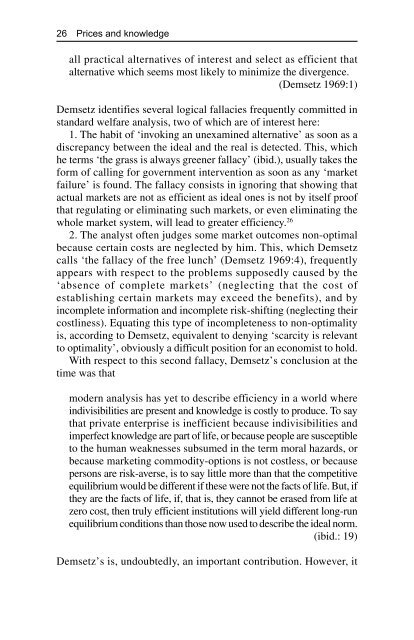Prices and knowledge: A market-process perspective
Prices and knowledge: A market-process perspective
Prices and knowledge: A market-process perspective
Create successful ePaper yourself
Turn your PDF publications into a flip-book with our unique Google optimized e-Paper software.
26 <strong>Prices</strong> <strong>and</strong> <strong>knowledge</strong>all practical alternatives of interest <strong>and</strong> select as efficient thatalternative which seems most likely to minimize the divergence.(Demsetz 1969:1)Demsetz identifies several logical fallacies frequently committed inst<strong>and</strong>ard welfare analysis, two of which are of interest here:1. The habit of ‘invoking an unexamined alternative’ as soon as adiscrepancy between the ideal <strong>and</strong> the real is detected. This, whichhe terms ‘the grass is always greener fallacy’ (ibid.), usually takes theform of calling for government intervention as soon as any ‘<strong>market</strong>failure’ is found. The fallacy consists in ignoring that showing thatactual <strong>market</strong>s are not as efficient as ideal ones is not by itself proofthat regulating or eliminating such <strong>market</strong>s, or even eliminating thewhole <strong>market</strong> system, will lead to greater efficiency. 262. The analyst often judges some <strong>market</strong> outcomes non-optimalbecause certain costs are neglected by him. This, which Demsetzcalls ‘the fallacy of the free lunch’ (Demsetz 1969:4), frequentlyappears with respect to the problems supposedly caused by the‘absence of complete <strong>market</strong>s’ (neglecting that the cost ofestablishing certain <strong>market</strong>s may exceed the benefits), <strong>and</strong> byincomplete information <strong>and</strong> incomplete risk-shifting (neglecting theircostliness). Equating this type of incompleteness to non-optimalityis, according to Demsetz, equivalent to denying ‘scarcity is relevantto optimality’, obviously a difficult position for an economist to hold.With respect to this second fallacy, Demsetz’s conclusion at thetime was thatmodern analysis has yet to describe efficiency in a world whereindivisibilities are present <strong>and</strong> <strong>knowledge</strong> is costly to produce. To saythat private enterprise is inefficient because indivisibilities <strong>and</strong>imperfect <strong>knowledge</strong> are part of life, or because people are susceptibleto the human weaknesses subsumed in the term moral hazards, orbecause <strong>market</strong>ing commodity-options is not costless, or becausepersons are risk-averse, is to say little more than that the competitiveequilibrium would be different if these were not the facts of life. But, ifthey are the facts of life, if, that is, they cannot be erased from life atzero cost, then truly efficient institutions will yield different long-runequilibrium conditions than those now used to describe the ideal norm.(ibid.: 19)Demsetz’s is, undoubtedly, an important contribution. However, it
















